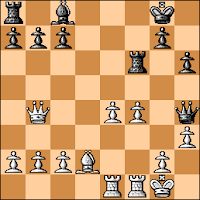I can handle most variations of the Jerome Gambit (1.e4 e5 2.Nf3 Nc6 3.Bc4 Bc5 4.Bxf7+), even the refutation lines, but I keep tripping over the Semi-Italian Four Knights Jerome Gambit – even after my opponent has blundered back a piece to me.
It must be psychological: the loss this time had nothing to do with the opening, I blundered away a Rook in an even ending. For other unfortunate examples of "snatching defeat from the jaws of victory" see "My Turn to Blunder" and "My Turn Again".
perrypawnpusher - Angstrem
blitz, FICS, 2010
1.e4 e5 2.Nf3 Nc6 3.Bc4 h6
The Semi-Italian Opening.
4.0-0 Nf6 5.Nc3 Bc5
The Semi-Italian Four Knights Game.
6.Bxf7+
The Semi-Italian Four Knights Jerome Gambit.
6...Kxf7 7.Nxe5+ Nxe5 8.d4
8...Bxd4 9.Qxd4 d6 10.f4 Nc6 11.Qd3
The full Queen retreat was seein in ontocaustic - defjavid, FICS, 2009: 11.Qd1 Bg4 12.Qd3 Nb4 13.Qc4+ Kf8 14.Qxb4 Qe7 15.e5 Nh5 16.f5 Qe6 17.fxe6+ Black reigned.
11...Re8
Alternately: 11...Be6 12.Bd2 Nb4 13.Qg3 Nxc2 14.Rac1 Nd4 15.f5 Bd7 16.Qg6+ Kg8 17.Be3 Be8 18.Qg3 Nc6 19.Bf4 Nh5 20.Qe3 Nxf4 21.Rxf4 Qg5 22.Qf2 Ne5 23.h4 Qh5 24.Rd1 a5 25.f6 Ng4 26.Qg3 Qc5+ 27.Kh1 h5 28.Rxg4 hxg4 29.Qxg4 Rh7 30.Rd5 Qf2 31.h5 Qf1+ 32.Kh2 Qxf6 33.Rf5 Qd4 34.Qf3 Bd7 35.Rd5 Qf6 36.Qxf6 gxf6 37.Kg3 Rg7+ 38.Kf3 Bg4+ 39.Kf4 Be6 40.Rd2 Rg5 White resigned, perrypawnpusher - HRoark, blitz FICS, 2010; and
11...Rf8 12.Bd2 Kg8 13.Rae1 Nb4 14.Qc4+ d5 15.Qxb4 Ng4 16.Nxd5 Qh4 17.h3 Nf6 18.Nxf6+ Rxf6 19.e5 Rg6 20.Qb3+ Be6 21.Qf3 Bxh3 22.Rf2 Rg3 23.Qxb7 Rf8 24.e6 Rf6 25.e7 Bd7 26.e8Q+ Bxe8 27.Rxe8+ Kh7 28.Qe4+ Rgg6 29.Qd3 Qg4 30.Ree2 h5 31.f5 Rd6 32.fxg6+ Rxg6 33.Qf5 Qd4 34.Qxh5+ Rh6 35.Bxh6 gxh6 36.Re7+ Kg8 37.Qg6+ Kh8 38.Re8 checkmate, perrypawnpusher - pwr, blitz, FICS, 2010.
12.Bd2 Kg8 13.Rae1 Nb4
Black has brought his King to safety, and should continue with his development. The text move loses a piece, unless Black prepares it, as he did in perrypawnpusher - JohnBr, blitz, FICS, 2010: 13...Kh8 14.h3 Nb4 15.Qe2 Bd7 16.Bc1 Nfd5 17.Nxd5 Nxd5 18.Qh5 Nf6 19.Qg6 Re6 20.e5 Ng8 21.Qg3 Qe7 22.exd6 cxd6 23.b3 Rxe1 24.Rxe1 Qf7 25.Bb2 Re8 26.Rf1 Nf6 27.Qd3 d5 28.g4 Ne4 29.f5 Qe7 30.Qxd5 Ng5 31.Kg2 Bc6 White resigned
14.Qc4+ Be6 15.Qxb4 c5 16.Qxb7
White should be able to survive his pawn-grabbing, but it complicates the position.
16...Bc4 17.Rf3 a6 18.Nd5 Rb8
19.Nxf6+ Qxf6 20.e5 dxe5
It is possible that Black should have gotten the Queens off the board and gone towards a Bishops-of-opposite-colors endgame, i.e. : 20...Rxb7 21.exf6 Rxe1+ 22.Bxe1 Bxa2 23.b3 gxf6 24.Rd3 Re7 25.Kf2 Bb1 26.Rxd6 Bxc2 27.Rxf6 Bxb3.
analysis diagram
21.fxe5
White did not need this pawn, but he did need to get his Queen off of the diagonal that she shared with his Rook: 21.Qe4.
21...Qh4
A missed opportunity to win the exchange: 21...Qd8 22.Qe4 Bd5
22.Qe4 Qxe4 23.Rxe4
23...Bxa2
The same opportunity to win the exchange existed with 23...Bd5.
24.b3 Bb1 25.Rc3 Red8 26.Be1 Rd1
It looks like Black is whipping up some counter-play, but 27.e6 now for White shows that the first player has the advantage.
By ignoring his e-pawn, White misses chances to put the game away; and the game drifts toward drawn.
27.Kf2 Rf8+ 28.Ke2 Rdd8 29.Ra4 Rfe8
30.Rxc5 Rc8 31.Rxc8 Rxc8
32.Kd2 Bxc2 33.Rxa6 Bxb3
34.Ke2
A blunder in a mostly-even position.
34...Bc4+ 35.Kf3 Bxa6 White resigned



















































